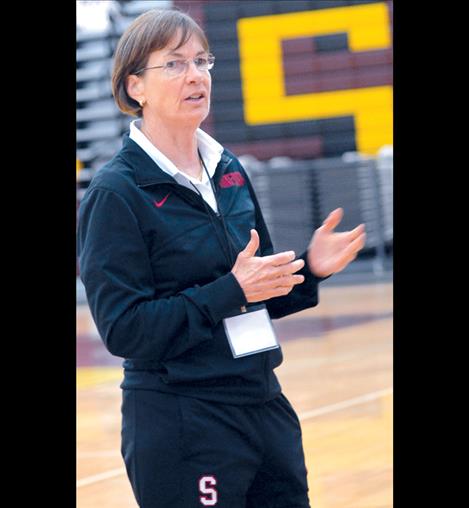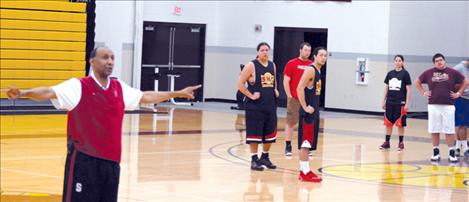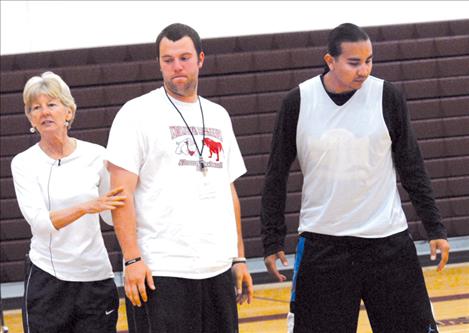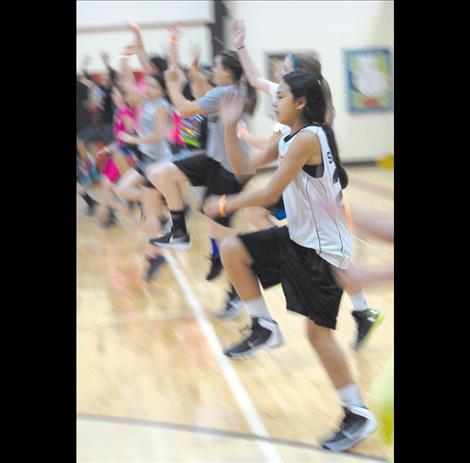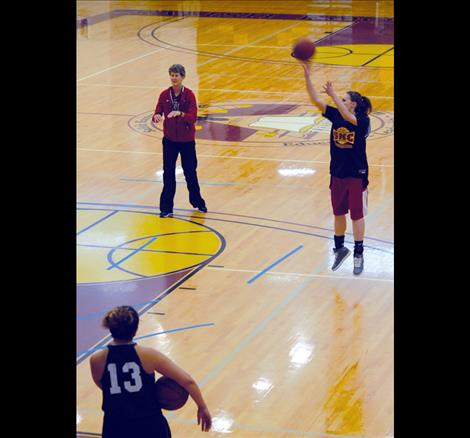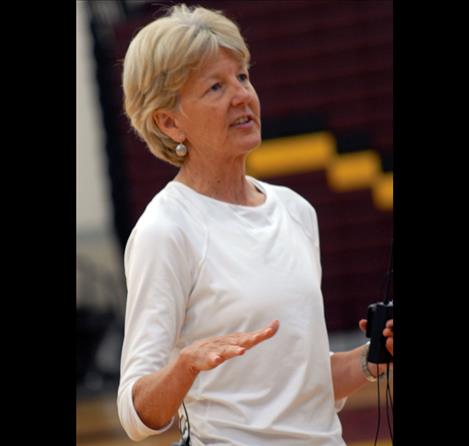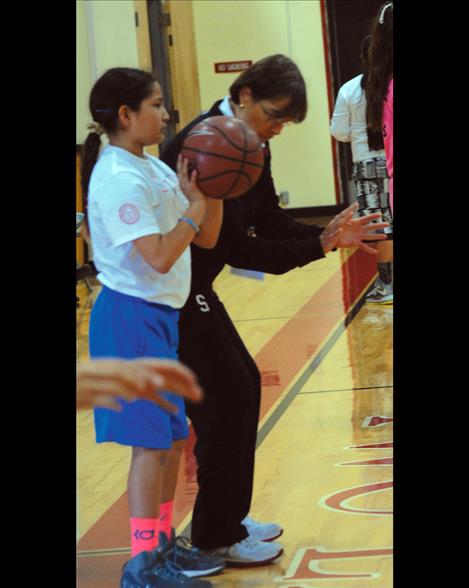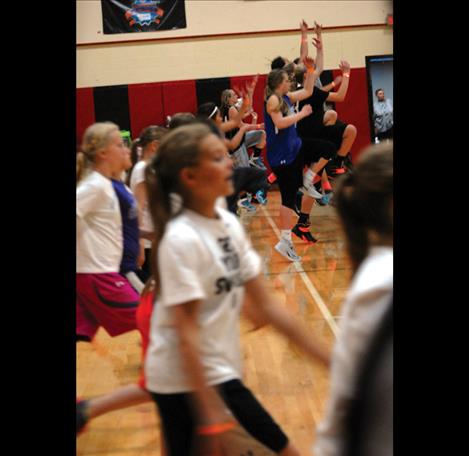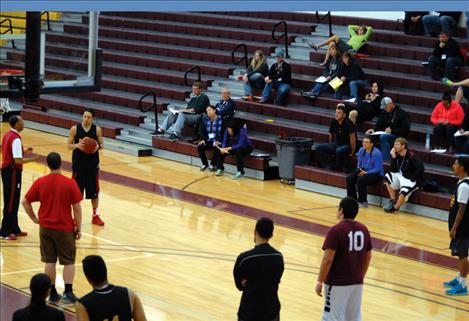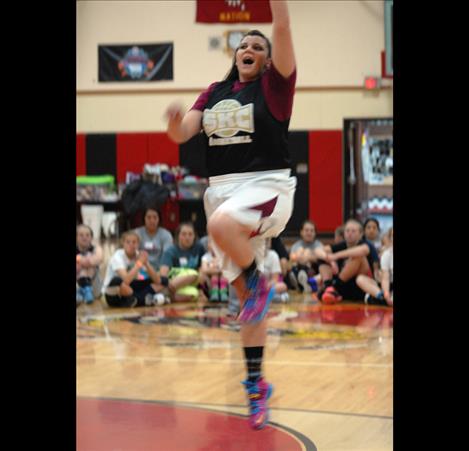Skill Drills
Youth, coaches learn from the best
Hey savvy news reader! Thanks for choosing local.
You are now reading
2 of 3 free articles.
PABLO — The thud, thud of basketballs and the squeak of basketball shoes are nothing new to the Joe McDonald Health and Fitness Center, but the all-star slate of coaches presenting at The Hoop Coaches Clinic May 15-17 may never be topped.
Headlining the list were Stanford University’s women’s coach Tara VanDerveer, Stanford men’s coach Johnny Dawkins, Ceal Barry, Amy Tucker, Heidi VanDerveer and MJ and Ganon Baker.
How they came to the Salish Kootenai College campus for a coaching clinic is an interesting story.
Vikki Howard is a special education professor at the University of Montana Western and she knew Tara VanDerveer after playing for Tara in her first year as a coach at the University of Idaho. The two remained in touch. Then when Howard met Juan Perez, SKC Bison girls’ coach, Perez brought up his idea about a clinic for kids. So Howard called Tara, and after three years and a lot of work, the idea became the Hoop Coaches’ Clinic
“Tara said a coaches’ clinic would have more impact,” Howard explained, since it would involve teaching so many more players.
Perez said, “I’m just so grateful to Vikki.”
Perez added that local coaches realizing that even ‘elite’ coaches are approachable, is a bonus.
Perez’s success in having a youth clinic allowed 50 local kids - boys in grades four to six, and girls in grades five to eight, to attend a free basketball clinic and work with Ganon, MJ Baker and Heidi at Linderman Middle School gym in Polson and Two Eagle River School gym in Pablo.
Heidi is head women’s coach for the University of California San Diego. While working with Bison women players, she drilled the girls on right and left-handed lay-ups and jump shots. She was joined by her sister Tara for work on shooting.
Arlee eighth grader Alyssia Vanderburg liked the clinic.
“I learned a lot of things I can work on by myself,” she said.
She wants to concentrate on ball handling.
Yelena Blomquist, 12, explained Ganon and MJ’s core work with the girls earlier that morning.
“We had to keep our feet in the air for six minutes,” she said, “and move the ball around our waists.”
Ganon swears it was four minutes and 30 seconds.
What he wants the kids to learn from him is “to have passion and a work ethic in whatever they do” so they can make a difference in society.
He runs camps and clinics and is a Nike Skill Development trainer. Ganon also is a partner and executive director of Elev8 Sports Institute, Delray Beach, Florida.
MJ was recently hired as the head women’s basketball coach at Broward College.
About 60 college, high school, elementary and middle school coaches from around the state and North Dakota learned how the VanDerveer sisters, Dawkins, Barry, Tucker and the Bakers work with their players.
Knowing that basketball is very popular in Native American communities, Tara said the group has done clinics in New Mexico on the Navajo reservation and in Botswana. “Basketball to me is about meritocracy; if you get it done, it doesn’t matter if you are a Martian,” Tara said.
As well as visiting the TERS gym and working with the girls on shooting, Tara spoke about practice planning and team offense, using Bison players to demonstrate and run drills.
For more and better shots, identify the best shooters, Tara said.
Barry, who coached at Colorado University in Boulder, Colorado for 22 years, focused her talk on defense.
After saying she admired the coaches attending the conference, Barry gave them some advice.
“Don’t practice so long you bore yourself,” she said, “and don’t blame the kids.”
Tucker, Tara VanDerveer’s associate head coach and recruiting coordinator, focused on position work, post and perimeter moves.
She said the clinics are meaningful for the coaches, not only because of learning new skills, but because they meet and interact with their peers.
Dawkins took the Sunday morning slot, again using Bison players to demonstrate.
Before playing for the NBA, Dawkins played college ball for the Duke Blue Devils, was an All-American and an alternate to the Olympics. He was on the Duke coaching staff until he came to Stanford.
With the Stanford Cardinal, he stresses looking to be committed to running; great spacing in offense; make sure the guys understand the ball moves in 25 seconds and screening.
“We sprint our lanes, not run them,” Dawkins said, selecting a Bison wing to make it down and back in 10 seconds, otherwise the whole group ran sprints.
Feedback from coaches was positive.
“The clinic’s priceless — the opportunity to listen to Tara VanDerveer. The point is about positive coaching,” said Zach Conko-Camel, Bison men’s coach.
He’s learned things he’ll incorporate in Bison practices and games.
Browning High School sent three coaches, Mark Magee, Maurice Redhorn and Daryl Croff.
Redhorn and Croff were impressed with the conditioning.
“The intensity of the drills they run, the players paying attention at all times, talking and moving, makes practicing fun,” Redhorn said, and Croff agreed.
Magee said it’s great to see new drills and add skill builders to a coach’s repertoire, such as developing fundamentals, speed and agility and ball handling.
“Stanford’s real successful, too,” Magee said.
Magee liked the Ganon Baker series, too.
Corvallis coach Shylah Poling agreed. She coaches eighth graders and helps with the high school program.
“I love clinics that are in the gym. They provide good visuals,” Poling said.
Teri Ogle coaches high school girls basketball in White Sulphur Springs. She picked up lots of drills to use with her team. She felt the presenters focused on how to teach, which she appreciated.
The whole clinic stressed positive coaching, Perez said.
“You can be an effective coach without being a screamer, yeller or abusive,” he said.















